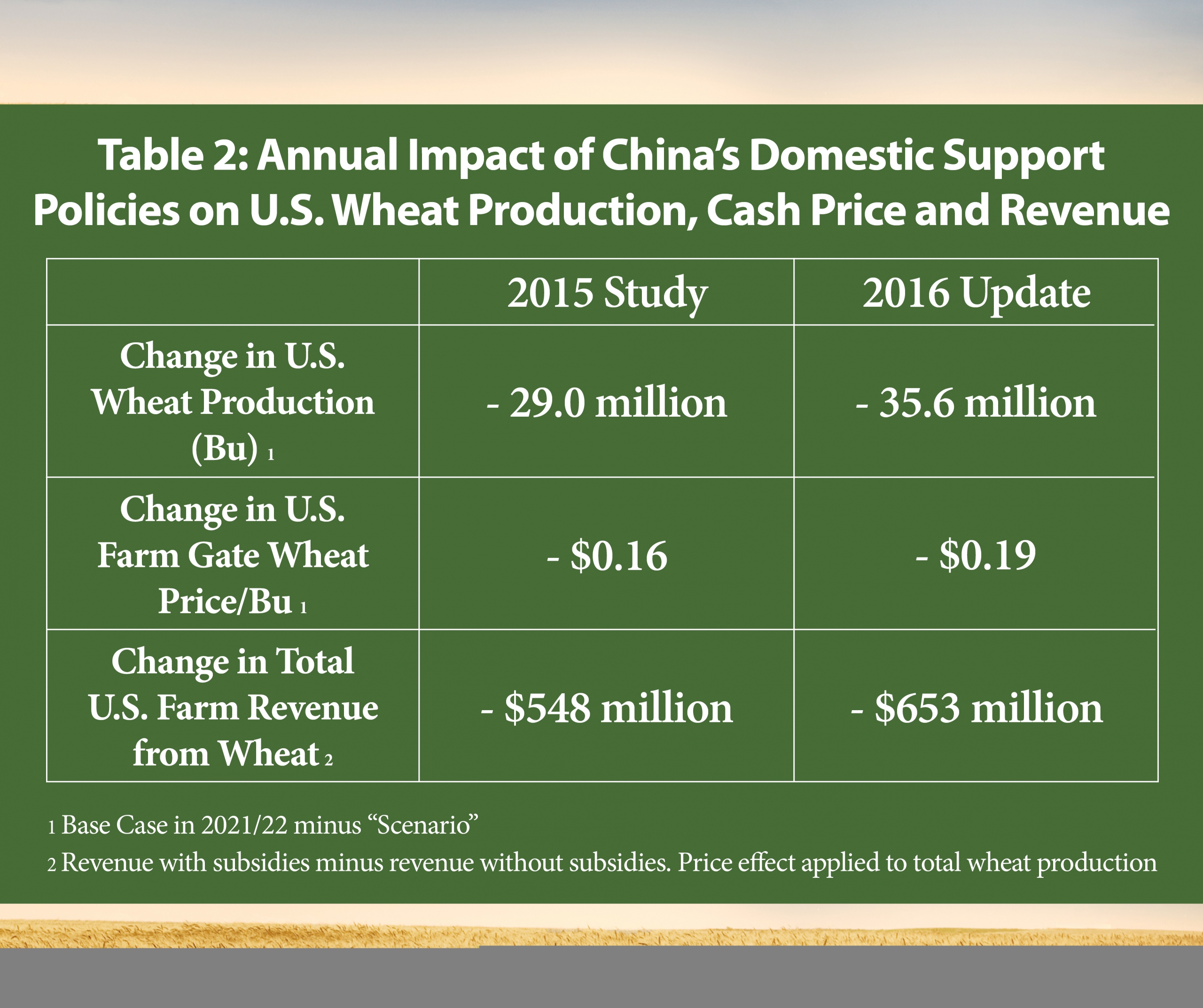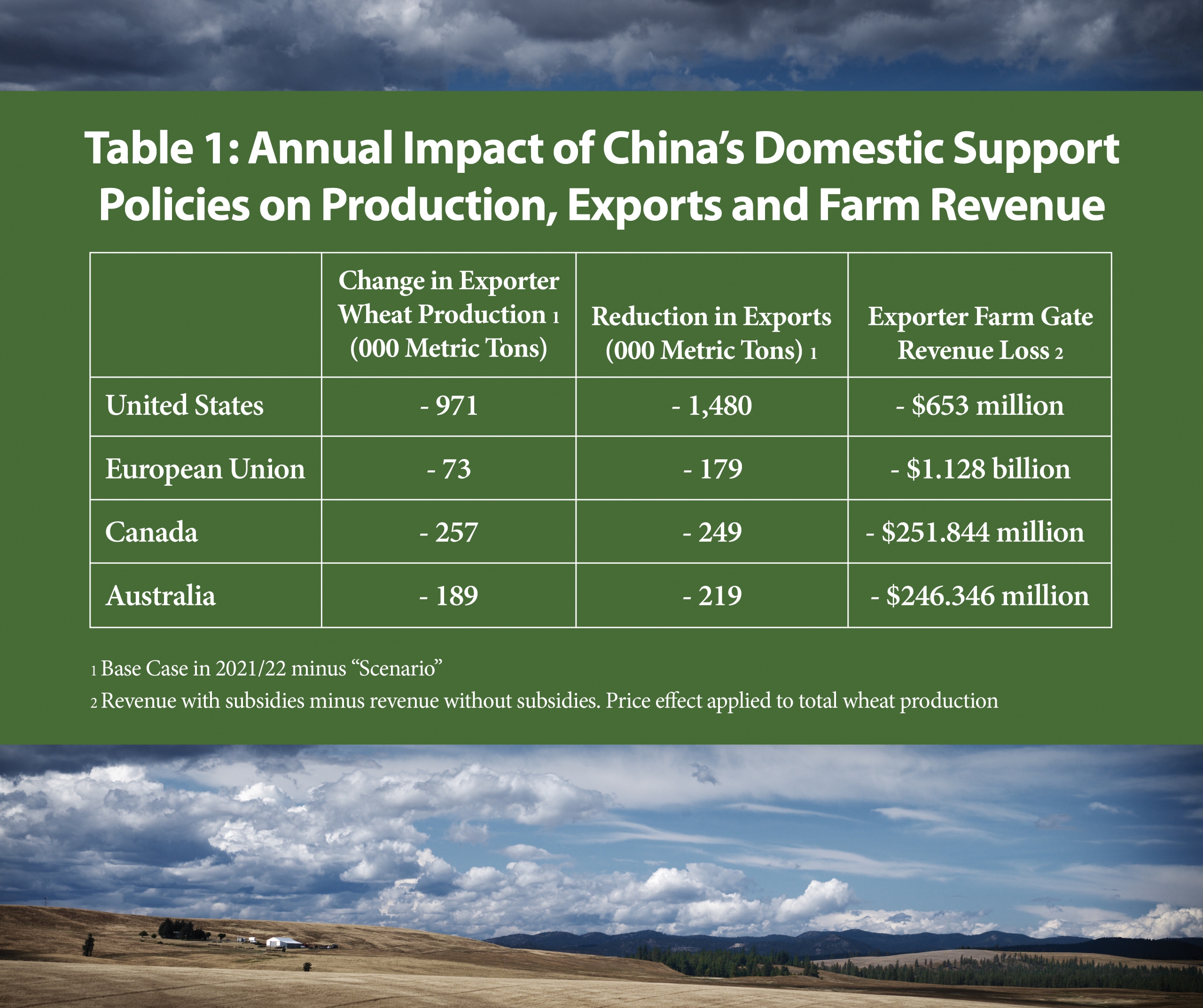ARLINGTON, Virginia — U.S. Wheat Associates (USW) and the National Association of Wheat Growers (NAWG) welcome the Obama Administration’s new trade enforcement action against China at the World Trade Organization (WTO). The significant investigative effort by the Office of the U.S. Trade Representative (USTR) and the U.S. Department of Agriculture (USDA) followed five years of work by USW, NAWG and other industry partners to demonstrate how China’s domestic support policies hurt U.S. farmers.
This enforcement action challenges the level of China’s trade-distorting market price support programs for wheat as well as for corn and rice. In describing its action, USTR said “the level of support provided through these programs in excess of China’s commitment was nearly $100 billion.”
These programs cost U.S. wheat farmers between $650 and $700 million annually in lost income by pre-empting export opportunity and suppressing global prices, according to a 2016 Iowa State University study sponsored by USW. That loss estimate is actually 19 percent more than the losses estimated by a similar 2015 study due to the effect of increasing global stocks and resulting market price decline.
“Wheat production subsidies in China and other advanced developing countries are the single biggest policy issue affecting our farm gate prices and global trade flows,” said USW President Alan Tracy. “In taking this step, USTR and USDA are demonstrating that trade enforcement can ensure that our many trade agreements and a pro-trade agenda really work for American farmers.”
“This enforcement action shows a welcome willingness to defend farmers against governments that blatantly disregard the rules of the road under their trade agreements,” said NAWG President Gordon Stoner, a wheat grower from Outlook, MT. “It comes at a critical time for farmers who have seen market prices collapse to unsustainable levels in recent years.”
A 2014 study by DTB Associates, also sponsored by USW, showed that China’s minimum procurement price of about $10 per bushel for wheat, in addition to other subsidies, violates China’s WTO commitments. That market price support is so high that the Chinese government has to purchase and store enormous stocks of domestic wheat. As a result, USDA estimates that by June 2017, China will hold 44 percent of the world’s wheat stocks, which will be at record levels and further depress market prices. This also hurts Chinese flour millers who are forced to purchase overpriced domestic wheat from these stocks and hurts their customers who pay more for the flour.
Noted Iowa State University agricultural economist Dr. Dermot Hayes conducted the 2015 and 2016 studies of domestic support effects. In reviewing the 2016 study results, which compared a base case including China’s current support to a new scenario in which the factors represented by China’s policies were removed, Dr. Hayes said farmers there would grow less wheat because domestic prices would fall and input costs would increase.
“In our comparison, that would benefit farmers in the United States and other wheat exporting countries as China would need to increase its imports to more than 9 million metric tons,” Dr. Hayes said. “The corresponding lift in wheat exports would increase U.S. farm income from wheat by 19 cents per bushel.”
“China may try to cloak its market price support as necessary to achieve self-sufficiency in wheat production, but this does not justify ignoring its trade commitments,” said Tracy. “Trade plays a vital role in food security, as no country can truly be self-sufficient in food production. The studies we have sponsored clearly show that eliminating its expensive market price support programs and letting the market work to meet their wheat needs would reduce the cost of food for Chinese consumers.”
“Trade agreements cannot meet their promise if other countries ignore the rules, no matter if the agreements are multilateral, bilateral or regional like the Trans-Pacific Partnership,” said Stoner. “That TPP has improved enforcement mechanisms is one more reason we strongly support its passage. Our grower organizations fully support this new trade enforcement action with China, and we will continue to work with our government and industry partners to address other trade distorting issues.”
USW and NAWG have posted the Iowa State studies online at https://bit.ly/1XPLrLo and https://www.wheatworld.org/issues/trade/. For results of two DTB Associates studies measuring domestic support in advanced developing countries, visit www.dtbassociates.com/docs/DomesticSupportStudy11-2014.pdf and www.dtbassociates.com/docs/domesticsupportstudy.pdf. For a third party analysis of individual policy measures by country, visit https://www.oecd.org/tad/agricultural-policies/producerandconsumersupportestimatesdatabase.htm#country.
USW’s mission is to “develop, maintain, and expand international markets to enhance the profitability of U.S. wheat producers and their customers.” USW activities in more than 100 countries are made possible through producer checkoff dollars managed by 19 state wheat commissions and cost-share funding provided by USDA/Foreign Agricultural Service. USW maintains 17 offices strategically located around the world to help wheat buyers, millers, bakers, wheat food processors and government officials understand the quality, value and reliability of all six classes of U.S. wheat. For more information, visit our website at www.uswheat.org.
NAWG is a federation of 22 state wheat grower associations that works to represent the needs and interests of wheat producers before Congress and federal agencies. Based in Washington, DC, NAWG is grower-governed and grower-funded, and works in areas as diverse as federal farm policy, trade, environmental regulation, agricultural research and sustainability.
# # #
Nondiscrimination and Alternate Means of Communications
U.S. Wheat Associates prohibits discrimination in all its programs and activities on the basis of race, color, religion, national origin, gender, marital or family status, age, disability, political beliefs or sexual orientation. Persons with disabilities who require alternative means for communication of program information (Braille, large print, audiotape, etc.) should contact U.S. Wheat Associates at 202-463-0999 (TDD/TTY – 800-877-8339, or from outside the U.S.- 605-331-4923). To file a complaint of discrimination, write to Vice President of Finance, U.S. Wheat Associates, 3103 10th Street, North, Arlington, VA 22201, or call 202-463-0999. U.S. Wheat Associates is an equal opportunity provider and employer.




